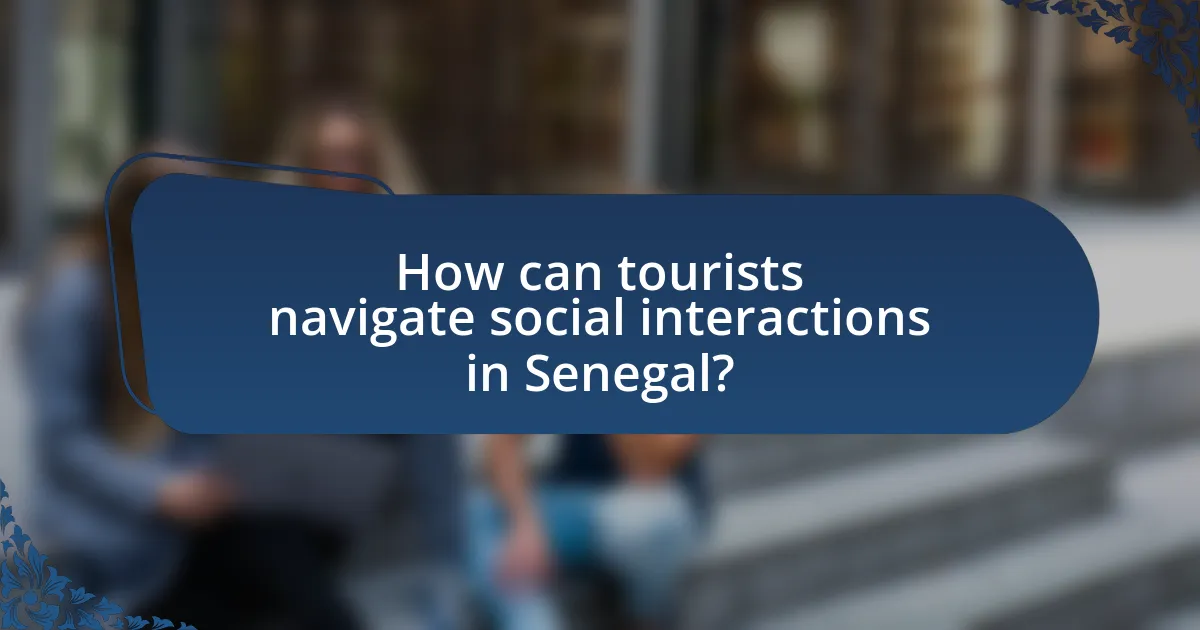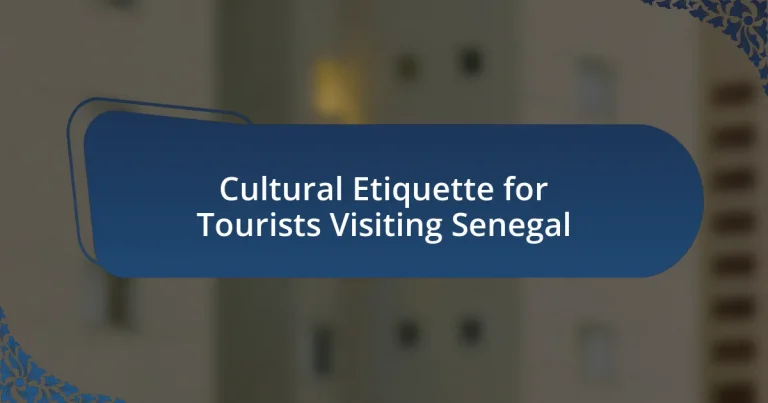Cultural etiquette for tourists visiting Senegal is essential for fostering respectful interactions and enhancing the travel experience. Key practices include proper greetings, modest dress, and understanding local customs, such as the significance of hospitality and communal values. Tourists should be aware of the importance of family and community, as well as the influence of Islam on cultural practices. Ignoring these etiquettes can lead to misunderstandings and social alienation, while adherence can enrich cultural immersion and promote positive relationships with locals. Understanding these aspects is crucial for a meaningful visit to Senegal.

What is Cultural Etiquette for Tourists Visiting Senegal?
Cultural etiquette for tourists visiting Senegal includes greeting locals with a handshake and using the right hand for giving and receiving items. In Senegal, greetings are an essential part of social interaction, often involving inquiries about health and family. Additionally, modest dress is encouraged, particularly in rural areas, to respect local customs. It is also important to ask for permission before taking photographs of people, as this can be seen as intrusive. These practices reflect the values of respect and community that are central to Senegalese culture.
Why is understanding cultural etiquette important for tourists in Senegal?
Understanding cultural etiquette is crucial for tourists in Senegal because it fosters respectful interactions and enhances the overall travel experience. Senegalese culture places a strong emphasis on hospitality and social norms, such as greetings and dress codes, which are integral to building relationships. For instance, greeting people properly is a significant aspect of daily life; failing to do so may be perceived as rude. Additionally, understanding local customs, such as the importance of sharing meals and respecting elders, can lead to deeper connections with the community. This knowledge not only helps tourists avoid unintentional offenses but also enriches their cultural immersion, making their visit more meaningful and enjoyable.
What are the potential consequences of ignoring cultural etiquette in Senegal?
Ignoring cultural etiquette in Senegal can lead to social alienation and misunderstandings. Senegalese culture places a strong emphasis on respect, hospitality, and communal values, so failing to adhere to these norms may result in offense to locals. For instance, not greeting people properly or disregarding traditional customs during meals can be perceived as disrespectful, potentially damaging relationships and hindering positive interactions. Additionally, tourists may face negative reputational consequences, as word-of-mouth can influence how future visitors are treated based on previous experiences.
How can cultural etiquette enhance a tourist’s experience in Senegal?
Cultural etiquette can significantly enhance a tourist’s experience in Senegal by fostering respectful interactions and deeper connections with the local community. Understanding and practicing cultural norms, such as greeting people with “As-salamu alaykum” and using the right hand for giving and receiving items, demonstrates respect and builds rapport. This respectful behavior can lead to more meaningful exchanges, as locals are often more willing to share their culture, traditions, and insights with tourists who show appreciation for their customs. Additionally, participating in local ceremonies or festivals, while adhering to etiquette, allows tourists to engage authentically with Senegalese culture, enriching their travel experience.
What are the key aspects of Senegalese culture that tourists should be aware of?
Key aspects of Senegalese culture that tourists should be aware of include the importance of hospitality, respect for elders, and the significance of traditional music and dance. Senegalese people are known for their warm hospitality, often welcoming guests with open arms and offering food and drink as a sign of respect. Respect for elders is deeply ingrained in the culture, with greetings and formalities being essential in social interactions. Additionally, traditional music and dance play a vital role in cultural expression, with genres like mbalax being central to celebrations and community gatherings. These elements reflect the rich cultural heritage of Senegal and are crucial for tourists to understand in order to engage respectfully and meaningfully with the local community.
How does religion influence cultural practices in Senegal?
Religion significantly influences cultural practices in Senegal, primarily through the predominance of Islam, which is practiced by approximately 95% of the population. This religious framework shapes daily life, social norms, and community interactions, dictating practices such as prayer times, dietary restrictions, and festivals. For instance, the observance of Ramadan leads to communal fasting and increased charitable activities, fostering a sense of community and shared values. Additionally, Islamic teachings inform traditional ceremonies, such as weddings and naming rituals, which often incorporate religious elements, reinforcing the connection between faith and cultural identity. The integration of religious principles into cultural practices illustrates the profound impact of Islam on Senegalese society.
What role does family and community play in Senegalese society?
Family and community are central to Senegalese society, serving as the primary support system for individuals. In Senegal, familial ties dictate social interactions, with extended families often living together or in close proximity, fostering a sense of belonging and mutual assistance. Community involvement is also significant, as social gatherings and communal activities reinforce relationships and cultural traditions. The importance of family and community is evident in practices such as the celebration of religious and cultural events, where collective participation is expected, highlighting the interconnectedness of individuals within the society.
What are the common customs and traditions that tourists should respect?
Tourists visiting Senegal should respect the customs of greeting, dress codes, and dining etiquette. Greeting is fundamental in Senegalese culture; it is customary to greet everyone with a handshake or a verbal salutation, which reflects respect and friendliness. Dress codes are also significant; modest clothing is preferred, especially in rural areas and religious sites, to show respect for local customs. Dining etiquette includes waiting for the host to begin the meal and using the right hand for eating, as the left hand is considered unclean. These practices are rooted in Senegal’s cultural values and social norms, emphasizing respect and community.
What are the traditional greetings and how should they be used?
Traditional greetings in Senegal include “As-salamu alaykum,” which means “Peace be upon you,” and is commonly used among Muslims, and “Nanga def?” which translates to “How are you?” in Wolof, the national language. These greetings should be used with respect and sincerity, as they are integral to social interactions in Senegalese culture. When greeting someone, it is customary to shake hands, often accompanied by a light touch on the shoulder or a hug among friends and family. Using these greetings appropriately fosters goodwill and demonstrates cultural awareness, which is essential for positive engagement with the local community.
How should tourists behave during meals and social gatherings?
Tourists in Senegal should exhibit respectful and polite behavior during meals and social gatherings. This includes greeting hosts and guests warmly, often with a handshake or a nod, and waiting for the host to begin the meal before starting to eat. It is customary to eat with the right hand, as the left hand is considered unclean. Additionally, tourists should engage in conversation, showing interest in local customs and traditions, which fosters goodwill and connection. Observing local dining etiquette, such as sharing food from a communal dish, is also important, as it reflects the Senegalese value of community. These behaviors align with Senegal’s cultural norms, where hospitality and respect are paramount in social interactions.

How can tourists navigate social interactions in Senegal?
Tourists can navigate social interactions in Senegal by understanding and respecting local customs and communication styles. Engaging in greetings is essential; a handshake followed by placing the hand over the heart is common. Additionally, using basic Wolof phrases, such as “Jërëjëf” for thank you, fosters goodwill. Senegalese culture values politeness and indirect communication, so tourists should be attentive to non-verbal cues and avoid confrontational discussions. Understanding the importance of community and family in Senegalese society can also enhance interactions, as relationships often take precedence over transactions.
What are the dos and don’ts of social etiquette in Senegal?
In Senegal, it is essential to greet people warmly and respectfully, as greetings are a significant part of social etiquette. When meeting someone, a handshake followed by placing the hand over the heart is common, demonstrating sincerity. Additionally, it is important to use titles and show respect for elders, as age is highly valued in Senegalese culture.
Conversely, tourists should avoid discussing sensitive topics such as politics or religion, as these can lead to discomfort or conflict. It is also considered impolite to refuse food or drink offered by a host, as hospitality is a cornerstone of Senegalese culture. Furthermore, wearing revealing clothing is discouraged, particularly in rural areas, as it may be viewed as disrespectful.
What gestures or behaviors are considered disrespectful?
Gestures or behaviors considered disrespectful in Senegal include pointing with the index finger, using the left hand for greetings or passing items, and failing to greet individuals before engaging in conversation. Pointing with the index finger is seen as rude and can be interpreted as accusatory. The left hand is associated with uncleanliness in many West African cultures, including Senegal, making its use in social interactions inappropriate. Additionally, not greeting people, especially elders, before starting a conversation is viewed as a lack of respect and can offend the local customs.
How should tourists approach conversations with locals?
Tourists should approach conversations with locals in Senegal with respect and openness. Engaging in polite greetings, such as “As-salamu alaykum,” demonstrates cultural awareness and fosters goodwill. Additionally, tourists should show genuine interest in local customs and traditions, which can lead to more meaningful interactions. Research indicates that positive social exchanges enhance the travel experience and promote cultural understanding, as evidenced by studies highlighting the benefits of interpersonal communication in tourism contexts.
How does dress code impact cultural interactions in Senegal?
Dress code significantly impacts cultural interactions in Senegal by influencing perceptions of respect and social status. In Senegalese culture, traditional attire, such as the boubou for men and women, symbolizes cultural identity and adherence to social norms. Wearing appropriate clothing, particularly in rural areas or during religious events, fosters positive interactions and demonstrates respect for local customs. For instance, tourists who dress modestly and in accordance with local traditions are often viewed more favorably, facilitating smoother communication and deeper cultural exchanges. This adherence to dress code is supported by the fact that Senegal is a predominantly Muslim country, where modesty in clothing is highly valued, reinforcing the importance of understanding and respecting local dress norms to enhance cultural interactions.
What types of clothing are considered appropriate for tourists?
Appropriate clothing for tourists in Senegal includes lightweight, breathable fabrics such as cotton or linen, which are suitable for the warm climate. Tourists should wear modest attire, covering shoulders and knees, to respect local customs and cultural norms. For example, women are encouraged to wear long skirts or dresses, while men should opt for long pants and short-sleeved shirts. Additionally, wearing traditional garments like boubous can enhance cultural appreciation and acceptance. This guidance aligns with Senegal’s predominantly Muslim culture, where modesty is valued, making it essential for tourists to dress respectfully to avoid offending local sensibilities.
How can tourists show respect through their choice of attire?
Tourists can show respect through their choice of attire by wearing clothing that aligns with local customs and cultural norms in Senegal. In Senegal, modesty is highly valued, particularly in rural areas and during visits to religious sites. For instance, women are encouraged to wear long skirts or dresses and cover their shoulders, while men should avoid shorts and opt for long trousers. This adherence to local dress codes demonstrates an understanding of and respect for Senegalese culture, which emphasizes dignity and propriety in public appearances. By choosing attire that reflects these cultural expectations, tourists foster positive interactions with locals and contribute to a respectful exchange of cultural values.

What practical tips can tourists follow to ensure respectful engagement in Senegal?
Tourists can ensure respectful engagement in Senegal by observing local customs and traditions. Firstly, it is important to greet people properly, as greetings are a significant part of Senegalese culture; using phrases like “As-salamu alaykum” shows respect. Secondly, dressing modestly, especially in rural areas, demonstrates cultural sensitivity; women should wear dresses or skirts that cover the knees, while men should avoid shorts. Thirdly, tourists should ask for permission before taking photographs of individuals, as some may find it intrusive. Additionally, participating in local customs, such as sharing meals or attending community events, fosters goodwill and understanding. Lastly, learning a few basic phrases in Wolof, the national language, can enhance interactions and show appreciation for the local culture. These practices reflect the values of respect and community that are central to Senegalese society.
How can tourists prepare for their visit regarding cultural etiquette?
Tourists can prepare for their visit to Senegal regarding cultural etiquette by researching local customs and social norms. Understanding that Senegalese culture places a strong emphasis on respect, greetings, and hospitality is crucial; for instance, it is customary to greet everyone in a group before engaging in conversation. Additionally, tourists should familiarize themselves with appropriate dress codes, particularly in rural areas where modesty is valued. Engaging with local traditions, such as sharing meals and participating in community events, can enhance the experience and demonstrate respect for the culture. This preparation is validated by the fact that Senegal is known for its rich cultural heritage, where adherence to etiquette fosters positive interactions and mutual respect between visitors and locals.
What resources are available for learning about Senegalese culture before traveling?
Books, documentaries, and online courses are valuable resources for learning about Senegalese culture before traveling. Notable books include “The Senegalese Cookbook” by Aissatou Sow Sidibe, which provides insights into traditional cuisine, and “The History of Senegal” by David Robinson, offering a comprehensive overview of the country’s history and cultural practices. Documentaries such as “Senegal: A Journey Through the Land of Teranga” showcase the rich cultural heritage and social customs. Additionally, platforms like Coursera and Udemy offer online courses focused on Senegalese culture, language, and etiquette, enhancing understanding for prospective travelers. These resources collectively provide a well-rounded foundation for appreciating Senegal’s diverse cultural landscape.
How can tourists practice cultural sensitivity during their stay?
Tourists can practice cultural sensitivity during their stay in Senegal by respecting local customs and traditions. This includes learning basic phrases in Wolof, the most widely spoken language, which demonstrates appreciation for the culture. Additionally, tourists should dress modestly, particularly when visiting religious sites, as this aligns with local values regarding modesty. Engaging with local communities through respectful interactions and participating in cultural events can further enhance understanding and appreciation of Senegalese culture. According to the Senegalese Ministry of Tourism, such practices foster positive relationships between visitors and locals, promoting mutual respect and understanding.
What are some common misunderstandings tourists might encounter?
Tourists visiting Senegal often misunderstand the local customs and social norms, leading to unintentional offenses. One common misunderstanding is the expectation of personal space; Senegalese culture values close physical proximity during conversations, which may feel intrusive to tourists accustomed to more distance. Additionally, tourists might misinterpret the concept of time; in Senegal, punctuality is often viewed more flexibly, and social gatherings may start later than scheduled. Another frequent misconception involves greetings; failing to greet individuals properly can be seen as disrespectful, as greetings are an essential part of social interactions in Senegal. Understanding these cultural nuances is crucial for fostering respectful and positive interactions with locals.
How can tourists address language barriers respectfully?
Tourists can address language barriers respectfully by using simple phrases in the local language, such as greetings and polite expressions. This approach demonstrates an effort to connect with the local culture and fosters goodwill. For instance, learning basic Wolof phrases, like “Nanga def?” (How are you?), can enhance interactions and show respect for the local language. Additionally, employing non-verbal communication, such as gestures and facial expressions, can help convey messages when language fails. Research indicates that using local language elements can significantly improve the travel experience and build rapport, as noted in studies on intercultural communication.
What should tourists do if they accidentally offend someone?
Tourists who accidentally offend someone should promptly apologize and express genuine remorse. A sincere apology demonstrates respect for the offended individual’s feelings and acknowledges the cultural differences that may have led to the misunderstanding. In Senegal, where interpersonal relationships are highly valued, taking responsibility for one’s actions can help mend the situation. Additionally, tourists should listen to the offended person’s perspective and, if appropriate, seek to understand the cultural context behind the offense. This approach not only facilitates resolution but also fosters mutual respect and understanding between the tourist and the local community.
What are the best practices for engaging with local communities in Senegal?
The best practices for engaging with local communities in Senegal include showing respect for cultural norms, participating in community events, and learning basic local languages such as Wolof. Respecting cultural norms is crucial, as Senegalese society values greetings and politeness; for instance, it is customary to greet individuals before initiating conversations. Participating in community events, such as local festivals or markets, fosters connections and demonstrates interest in the culture. Learning basic phrases in Wolof can enhance communication and show appreciation for the local culture, as language is a significant aspect of identity in Senegal. These practices are supported by the country’s emphasis on hospitality and community, making them effective for meaningful engagement.
How can tourists contribute positively to local culture and economy?
Tourists can contribute positively to local culture and economy by engaging in cultural exchanges and supporting local businesses. When tourists participate in traditional activities, such as local festivals or crafts, they help preserve cultural heritage and promote understanding between cultures. Additionally, spending money at local markets, restaurants, and accommodations directly boosts the economy, creating jobs and sustaining livelihoods. For instance, a study by the World Travel & Tourism Council indicates that tourism can account for up to 10% of a country’s GDP, highlighting its significant economic impact.
What are the benefits of participating in cultural exchanges while visiting Senegal?
Participating in cultural exchanges while visiting Senegal enhances understanding and appreciation of local traditions and customs. Engaging with Senegalese communities allows tourists to experience authentic cultural practices, such as music, dance, and cuisine, fostering deeper connections. Additionally, cultural exchanges promote mutual respect and dialogue, breaking down stereotypes and building friendships. Research indicates that such interactions can lead to increased cultural sensitivity and awareness, enriching the travel experience and contributing to personal growth.





